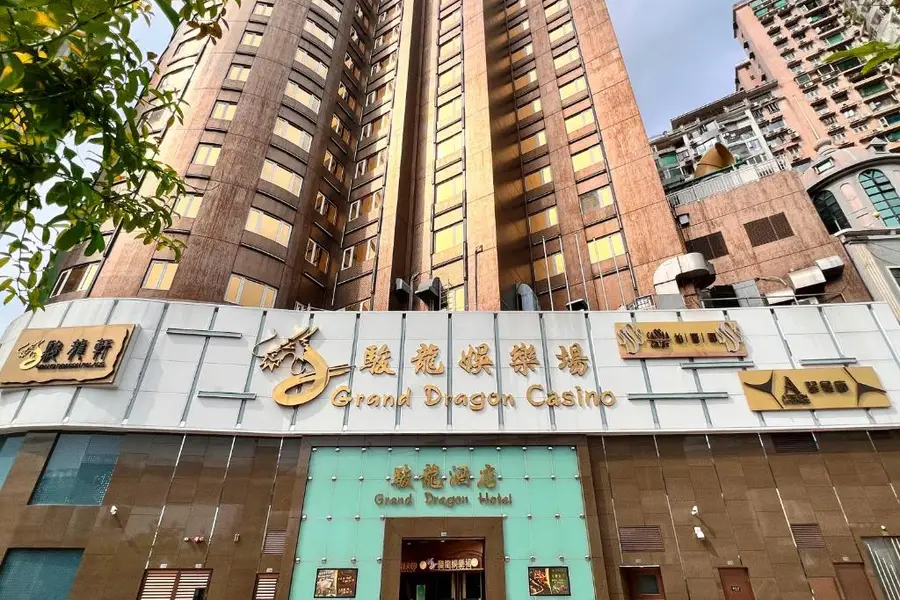‘Satellite casino’ era winds down in transforming Macao

The phasing out of smaller casinos operated by licensed gaming firms in non-gaming properties could help to boost gaming company margins
Key Takeaways:
- All 11 of Macao’s “satellite casinos” will be shuttered by the end of this year, ending a three-year transition to phase out such casinos
- Melco International, with just one satellite casino, will feel limited impact from its closure, while SJM Holdings, which has nine, will feel a much bigger impact
By Lee Shih Ta
This Monday was a historic day for Macao’s gaming sector, as Melco International Development Ltd. (0200.HK) announced it would close its Grand Dragon Casino by the end of the year. With that announcement, Melco became the first of the city’s gaming companies to announce the closure of its lone “satellite casino,” referring to casinos operated by licensed gaming companies on properties owned by third parties.
Melco said it would move affected assets and personnel, such as gaming tables, electronic gaming machines and employees, to its other properties.
Following that move, rival operators SJM Holdings (0880.HK) and Galaxy Entertainment (0027.HK) made similar announcements. All told, 11 satellite casinos now operating in Macao will close their doors by year-end, closing the curtain on an era when gaming activities were often conducted inside hotels and other properties on a revenue-sharing basis.
End of an era
The satellite casino model was originally conceived in Macao when a single company, Sociedade de Turismo e Diversões de Macao S.A., held the lone gaming license for the entire city. That meant anyone else who wanted to develop properties with on-site gaming could only do so by working with the company.
Thus the satellite model was born and evolved over the years, even after Macao opened up gambling to other licensees in the early 2000s. Under the model, gaming companies ran casinos on other properties like hotels, while the property owners shouldered actual operational risks. Gaming companies took a cut of revenues.
Such a model allowed many smaller local companies to enter the gaming sector with relative ease and contributed to the flourishing of hotels and other properties containing such casinos. At its peak, the city was home to more than 20 such satellite casinos. However, their lack of control over the entire property often led to structural regulatory blind spots for gaming companies, and areas around such casinos often became sites of rampant criminal activity.
Under the traditional model, around 40% of gross gaming revenue earned by these casinos would go to the city’s government, 55% would go to the satellite casino and 5% would go to the actual gaming licensee.
But the city’s new gaming law in 2022 stipulated that starting from 2026, properties where casinos are operated had to be owned by gaming companies themselves, or, in the case of satellite casinos, property owners could only collect management fees. That meant that property owners hosting satellite casinos could only receive management fees instead of sharing in casino revenue, making the proposition far less lucrative for them.
That change effectively dealt a death knell for the business model. While the law provided a three-year winding down period, satellite casinos in the Rio Hotel and Hotel Presidente, operated by Galaxy Entertainment, began shutting down as early as 2022, providing a glimpse of things to come.
According to a statement released by the Macao government, Melco International has decided to close its one satellite casino; among the nine satellite casinos operated by SJM Resorts, two are likely to shift to self-owned operations following acquisitions of the affected properties, while the remaining seven will all be closed; and Galaxy Entertainment has decided to close its lone remaining satellite casino. All the closures are expected to affect a total of 5,600 employees who will be redeployed by the gaming companies.
Analysts believe the transition will have limited impact on gaming company fundamentals and might even bring positive effects over the medium- to long-term.
According to UBS, such satellite casinos currently account for about 5% of the gaming market, and their shuttering represents an opportunity for demand to be reallocated, possibly increasing gaming company revenues. Profits from such reallocated demand would go completely to the gaming companies, potentially raising their EBITDA profit margins by 20% to 30%.
Complicated situation for SJM
According to JPMorgan, satellite casinos contributed less than 2% of Galaxy Entertainment’s and Melco’s EBITDA in the past 12 months, and thus the closure of such casinos is likely to have negligible impact on them. But the situation is more complex for SJM. Its seven satellite casinos set to close represent around 4% of its EBITDA and the resulting reallocation of around 440 gaming tables implies thousands of employees will need to be redeployed. If the company can’t increase its gaming table turnover rate, the reshuffle could potentially dent its profits.
Some of SJM’s satellite casinos are still generating profits, and thus their closure could cause some temporary deterioration of the company’s cash flow. While the company plans to move gaming tables from those casinos to its other newer properties, it might still lose some overall market share. Moreover, the company will need time to relocate all the tables to maximize their productivity. According to CLSA, a successful reallocation of these tables will help the new casinos recover the redeployment costs much faster.
Citi, on the other hand, is more pessimistic, pointing out that SJM is under significant financial pressure with HK$23.5 billion ($3 billion) in net liabilities in the first quarter of 2025, higher than the industry average. It said that SJM’s potential failure to handle the transition well could result in the risk of falling profits starting in 2026.
Hopes for a simpler landscape and higher profits were reflected in the companies’ stock prices. On Monday, shares of Melco and SJM both rose over 3%, while Galaxy Entertainment ticked up by 0.45%. By contrast, satellite casino property owners took a hit. Shares of one, Paradise Entertainment (1180.HK), crashed nearly 48% that day, as investors worried that the company would lose a revenue source that currently accounts for 66% of its total.
The end of the satellite casino era may bring some new quiet and tranquility to Macao, ending any criminal activity on the fringes of such properties as boisterous gaming is confined to large casinos. But the departure of such casinos also marks the start of a new era of reshuffling. Melco, Galaxy Entertainment and SJM can probably expect to see some short-term increases in their labor costs and other expenses. But a successful redeployment of assets could eventually work to their advantage, leaving more profits for them from their gambling operations that they no longer need to share with property owners.
To subscribe to Bamboo Works weekly free newsletter, click here





